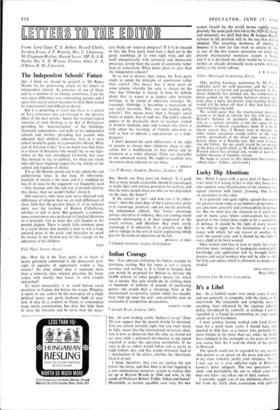your leading article 'Indian Courage' (June 10) you suggest that
the pound should be devalued. You are almost certainly right, but you must surely be fully aware that the international monetary situa- tion is now so desperate that this time we would not get away with a unilateral devaluation to the extent required to make the operation worthwhile. If we were to do so, others would follow suit as surely as night follows day, and this would obviously lead to a devaluation of the dollar, whether the Americans liked it or not.
I think, therefore, that you are putting the cart before the horse, and that what is in fact required is a new international monetary system to replace that set up at Bretton Woods in 1944 and now, in the words of Professor Robert Triffin, 'killed and buried.' Meanwhile, as nations squabble over what this new system should be, the world moves rapidly along precisely the same path that led to the 1929-32 slump, and ultimately we shall find that M Jacques Rucff's solution to the problem will be the one that will be adopted. The recurring weakness of sterling is because it is now far too weak to sustain its role as one of the two reserve currencies on which the _present international monetary system is based, and if it is devalued the effect would be to weaken further an already chronically weak system, with the dollar as the worst sufferer.
J. P. IV \TIM Talks, Mans lead, Godahning, Surrey
•
[The sterling balances, mentioned by Mr Evan5. explicitly carry no gold guarantee and the risk of devalution is a known and accepted hazard. As Pro- fessor Haberler has pointed out, the compound in- terest earned on the sterling balances ensures that, even after a hefty devalution, long-standing holder, would still be better off than if they had held non- interesting-bearing gold. We would agree that the international monetary system is in need of reform, but this will not cure Britain's balance of payments deficits. Sterling's role as a reserve currency is not the cause of our problems: it merely exacerbates them. It is by no means certain that, if Britain were to devalue, all other major currencies would follow to the same extent--particularly if the initial step were a tem- porary move to a floating rate. But even if even- one did follow, the net result would be an increase in the price of gold which. as M. Rueff (to whom Mr Warren refers) has pointed out, would at least be a helpful measure of liquidity reform.
We hope to return to this important but complex subject later.—Editor, SPECTATOR.] '






























 Previous page
Previous page